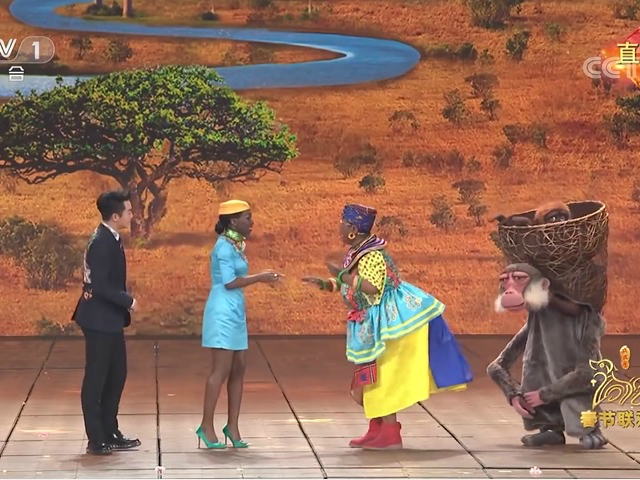A Chinese Lunar New Year television show is facing accusations of racism after featuring a routine starring a woman wearing face paint and enlarged buttocks to appear African.
The routine involved the caricatured woman entering the stage with a plate of fruit on her head, accompanied by an actor dressed in a monkey costume.
It reportedly begins with the African woman asking a Chinese man to pretend to be her husband when they see her mother, while a black woman playing her daughter says she intends to study in China but fears her mother will not allow it.
“Why wouldn’t I agree? A Chinese volunteer medical team saved my life when I was young,” she responds, according to a translation by Reuters. “Now Chinese kids are building a railroad for us. … I love Chinese people. I love China!”
The skit aired as part of a four-hour annual variety show celebrating the Lunar New Year, which can attract audiences of up to 800 million people. It caused an immediate uproar on social media, with some Chinese claiming they were “ashamed” of their country over the incident.
The skit’s intent was to promote Africa’s role in China’s “One Belt One Road” (OBOR) program, which was initially meant to connect Beijing to Europe through the ancient silk road, but has since expanded to include significant investment in Africa and Latin America.
In Africa, China has begun investing in everything from military bases to railroad construction teams, making it their largest single trading partner. China opened its first overseas military base in Djibouti, a short distance from Yemen and the Arabian peninsula, and has dumped millions into infrastructure projects the U.S. government has warned African states may have predatory ulterior motives. China has also used infrastructure projects to bribe African nations to abandon diplomatic ties with Taiwan.
Contrary to the image presented in the New Year program, Africans have increasingly looked askance at growing Chinese investment in their governments.
In the West, the use of dark face paint on people with lighter colored skin, otherwise known as blackface, is considered deeply offensive due to the history of minstrel shows where white entertainers would paint themselves black and perform condescending stereotypes.
As noted by the BBC, in China, “the vast majority of people have no experience of interacting with black people and are less aware of Europe’s and the US’ history of slavery and racism.”
In 2015, a Chinese promotional poster for the film Star Wars: The Force Awakens was widely criticized after it shrunk the size of lead actor John Boyega. Last year, a Chinese commercial also sparked outrage after a washing machine appeared to transform a black man into an Asian by using their detergent product.
Follow Ben Kew on Facebook, on Twitter at @ben_kew, or email him at bkew@breitbart.com.

COMMENTS
Please let us know if you're having issues with commenting.